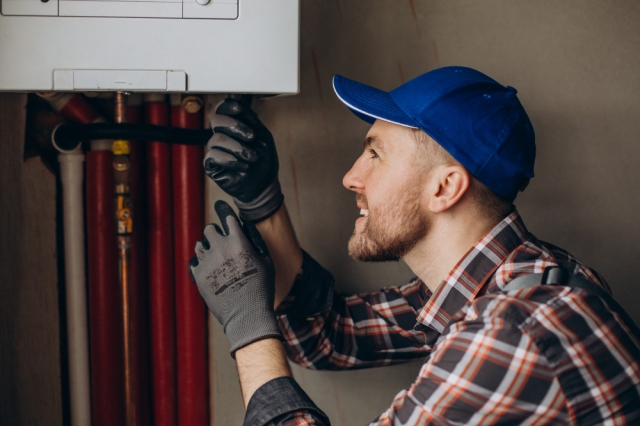A boiler breakdown can be a nightmare, especially during the winter when your reliable heating is on daily. When your boiler stops working, the first question that comes to mind is: Should I repair it or replace it?
This decision can feel overwhelming, but with the right information, you can make the best choice for your home and budget.
In this guide, we'll explore the factors you should consider when deciding whether to repair or replace your boiler. By the end, you'll clearly understand when a repair makes sense and when it's time to invest in a new boiler for your home.
Signs Your Boiler Needs Attention
Before deciding on repair or replacement, it's important to understand the signs of boiler trouble. Some common indicators include:
- Unusual noises like banging, gurgling, or whistling.
- Inconsistent heating or hot water supply, with temperatures fluctuating unpredictably.
- Leaks or low pressure may indicate a fault in the system.
- Frequent error codes or warning lights are displayed on the boiler.
- Rising energy bills suggest your boiler is operating inefficiently.
These problems could range from minor fixes to major faults, and diagnosing the problem accurately is the first step to deciding your next move.
When Should You Repair Your Boiler?
In many cases, repairing your boiler is the more cost-effective option. If the issue is minor, such as a faulty thermostat, a broken valve, or air trapped in the system, a professional engineer can resolve it quickly and affordably.
Here are some scenarios where repair is the better choice:
1. If your boiler is less than 10 years old and has been regularly serviced, it's likely still efficient and worth repairing.
2. If the repair bill is significantly less than half the cost of a new boiler, a repair makes financial sense.
3. If this is your boiler's first breakdown or an isolated issue, it's unlikely to need frequent repairs in the future.
Boiler repairs can also be a good interim solution if replacing the boiler immediately isn't feasible due to budget constraints.
When Is It Time to Replace Your Boiler?
While repairing may seem like the easier choice, there are times when replacing your boiler is the smarter long-term decision. A new boiler not only saves you money on ongoing repairs but can also improve your home's energy efficiency.
If your boiler is causing you more headaches than comfort, it might be time to consider a replacement. Boilers over 10-15 years old often struggle to keep up with modern efficiency standards, driving up both energy bills and repair costs.
Frequent breakdowns or repair bills that exceed half the value of your boiler are clear signs that sticking with the old unit could be draining your wallet.
Rising energy costs may also hint that your outdated boiler is burning more fuel than necessary, which is a problem easily solved with a sleek, energy-efficient upgrade.
Beyond efficiency, think about your household's needs. If your family has grown or your heating demands have shifted, a modern boiler can offer tailored solutions to keep everyone cosy.
Cost Comparison: Repair vs. Replace
The cost of repairing a boiler typically ranges from £100 to £500, depending on the nature of the fault and any parts that need replacing.
On the other hand, the cost of installing a new boiler starts at around £1,500, with high-efficiency models and complex installations costing upwards of £4,000.
While a boiler repair might be cheaper in the short term, frequent call-outs can quickly add up. A new boiler, despite the upfront expense, offers long-term savings through reduced energy bills and fewer breakdown and repair costs.
Benefits of Replacing Your Boiler
Replacing your boiler offers numerous advantages that go beyond just heating your home. First of all, modern boilers are built to meet high energy efficiency standards, which can significantly lower your utility bills while reducing your carbon footprint.
They are also more reliable, lowering the risk of unexpected breakdowns and giving you peace of mind during colder months. Many newer models feature advanced technology, including smart controls, making them not only easier to operate but also more environmentally friendly.
Additionally, upgrading to a sleek, efficient boiler can enhance your property's value, which is a key benefit if you're considering selling your home.
How to Make the Right Decision
When deciding whether to repair or replace your boiler, ask yourself these key questions:
- How old is the boiler, and is it still covered by warranty?
- What is the estimated repair cost, and how often has it needed fixing?
- Are my energy bills increasing due to inefficiency?
- Can I afford a replacement now, or would repair be a better short-term solution?
If you're still unsure, consult a Gas Safe registered engineer for an assessment. They can evaluate your boiler's condition and provide expert advice on your situation.
Preventative Measures to Avoid Future Breakdowns
Whether you choose to repair or replace, maintaining your boiler is vital to its longevity and performance.
Schedule annual boiler servicing to catch potential issues early, and ensure your system is cleaned and tested regularly. Investing in a boiler cover plan can also provide financial protection against unexpected repair costs.
Final Thoughts
Deciding whether to repair or replace your boiler is a big decision, but it doesn't have to be overwhelming. By weighing the costs, age, and efficiency of your current boiler, you can choose the option that works best for your home and budget.
A well-maintained boiler is the heart of a warm, comfortable home. Whether you opt for a repair or a new installation, taking action promptly ensures your heating system is ready to keep your home cosy when you need it most.






